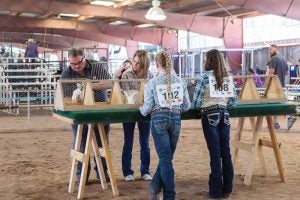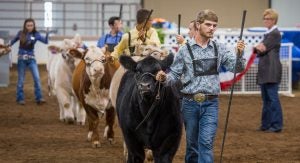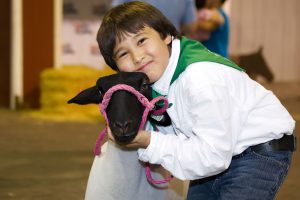County fairs are full of funnel cakes, carnivals, demo derbies, and — most importantly — opportunities for agricultural youth to show off their talents. Our young people in 4-H and FFA rely on county fairs for opportunities to show livestock, compete in livestock judging, and learn life lessons.
To many visitors, county fairs are good opportunities to look at animals and maybe learn a thing or two about agriculture. But not many people get to see all of the life lessons learned and hard work put into these kid’s projects.
Here are just a few of the life lessons kids learn through showing livestock:
1. How to Lose
Everyone hopes to win, but only one show person will walk out of the livestock show ring with the championship. While losing might not be very fun, it’s an important part of showing. Many kids put months or years of hard work into their animals and still don’t win. At the end of the day what matters is that these kids have put their best effort into their project, no matter the result.
This hard life lesson teaches livestock kids how to be gracious losers and how to be humble winners. This also shows kids how valuable the experience truly is when they finally win that grand champion ribbon.

2. Teamwork
Teamwork is a huge part of showing livestock, and not just between people. Each exhibitor needs to be a team with their animal. It takes daily practice to make sure the animal trusts you and wants to work as a team. Oftentimes families and exhibitors work together to fit (get their animals ready for the show) and practice. In fact, on show day it’s not uncommon to find an entire crew working to get each animal ready.
Learning to be a team player is an important life skill learned through showing livestock.
3. Responsibility
All livestock show people know that it takes a lot to get an animal ready to show. During fairs, animals need to be fed, watered, walked, washed and more! Before the fair, these animals need to be trained and cared for. It’s a lot of responsibility and work to care for and prepare these animals for the fair. Kids learn to be responsible individuals by learning how to take care of their animals starting at an early age.

4. Thankfulness
Not everyone gets the opportunity to show livestock or is able to have a mentor or support system to help them along the way. Show kids learn to be grateful to the people around them and for the opportunity to show livestock.
5. Sportsmanship
Most livestock show families know each other and go out of their way to encourage and help each other. Kids learn to congratulate others when they win, give encouragement to others that might be having a tough time and shake the hands of their competitors. Even when it’s been a tough day, these kids know how to be a good sport.
6. Leadership
As show kids get older, they need less help and tend to start doing most of the work on their own. This also includes teaching younger show people how to show and fit their animals. These older kids become role models and leaders for others.

7. Pride
At the end of the day, win or lose, what matters is the hard work each person puts into their animal. Through showing livestock, kids learn to take pride in their work and knowing that they tried their hardest, no matter the outcome.
8. Generosity
Show day can be stressful and things are bound to be forgotten, but most show families don’t hesitate to let others borrow equipment or lend a hand when needed. Livestock show kids learn by watching their parents, volunteers, and older showmen being generous with their time, talents and equipment. True family values instilled in agriculture!
The end goal of livestock showing at most county and state fairs is for kids to have fun, do some fundraising, learn new things and have an opportunity to show off something they worked hard on. The next time you’re looking at livestock at a county fair, just take a second to think of all the show kids you’re supporting and all of the life lessons learned in the barns of county fairs across the country.
Michelle Miller, the “Farm Babe,” is an internationally recognized keynote speaker, writer, and social media influencer and travels full time to advocate for agriculture. She comes from an Iowa-based row crop and livestock farming background and now resides on a timber farm in North Central Florida.



